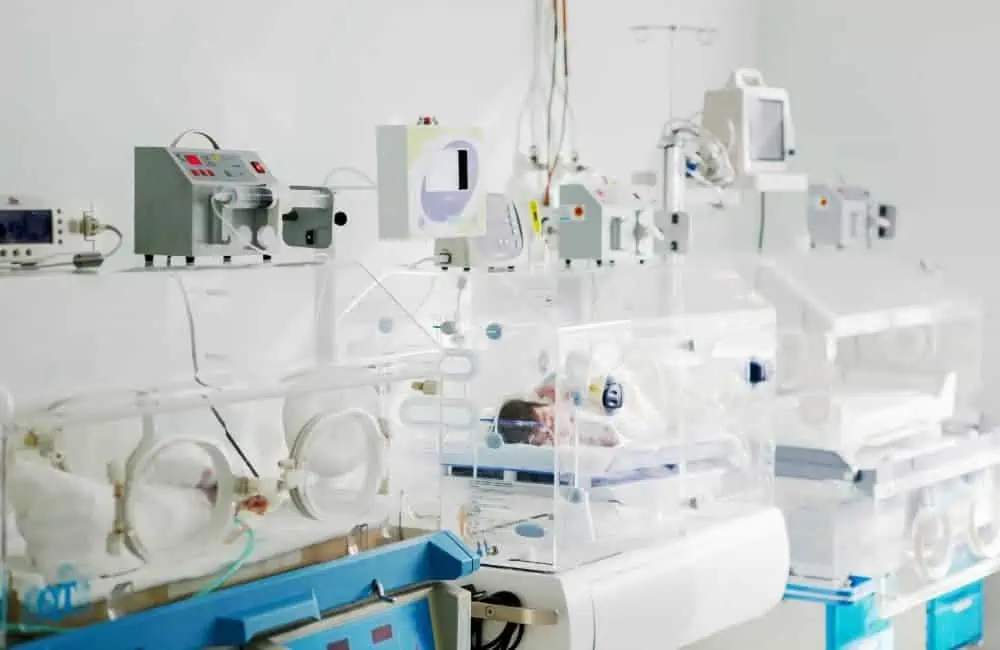What Are the Symptoms of Necrotizing Enterocolitis?
- Last Updated: August 4th, 2023

Attorney Jessica Paluch-Hoerman, founder of TruLaw, has over 28 years of experience as a personal injury and mass tort attorney, and previously worked as an international tax attorney at Deloitte. Jessie collaborates with attorneys nationwide — enabling her to share reliable, up-to-date legal information with our readers.
Legally Reviewed
This article has been written and reviewed for legal accuracy and clarity by the team of writers and legal experts at TruLaw and is as accurate as possible. This content should not be taken as legal advice from an attorney. If you would like to learn more about our owner and experienced injury lawyer, Jessie Paluch, you can do so here.
Fact-Checked
TruLaw does everything possible to make sure the information in this article is up to date and accurate. If you need specific legal advice about your case, contact us by using the chat on the bottom of this page. This article should not be taken as advice from an attorney.
What Are the Symptoms of Necrotizing Enterocolitis?
Necrotizing enterocolitis, also known as NEC, is a gastrointestinal illness that most commonly occurs in premature infants.
Roughly one in 1,000 preterm infants will contract the disease, while only one in 10,000 full-term infants is diagnosed with NEC.
NEC occurs in the small or large intestines.
As bacteria build up in the intestinal tract, they can begin to destroy the tissue that makes up the intestinal lining.
This can result in tissue death and perforations in the intestinal wall, which allows bacteria and waste to seep into the abdomen.
Bacteria can also get into the bloodstream and circulate around the body, causing a severe infection.


NEC has numerous causes, including viral and bacterial infections, intestinal injuries, underdeveloped intestines, and a lack of oxygen or blood flow to the intestines.
NEC can also be caused by feeding preterm infants cow’s milk-based formulas like Similac and Enfamil.
In fact, recent research has revealed that premature babies who receive bovine milk-based baby formulas are more likely to develop NEC than preterm infants who subsist exclusively on human breast milk.
Table of Contents
Symptoms of NEC in Preterm Infants
Some of the most common signs of NEC in premature infants include pain and swelling in the abdominal cavity, green and yellow vomit, lethargy, lack of weight gain, lack of appetite, constipation, apnea, slowed heart rate, hypotension (low blood pressure), and fluctuations in body temperature, among other symptoms.
An allergy to an ingredient in formula can also cause your baby to have an upset stomach after feeding.
Consider switching formulas to check if that relieves your baby’s symptoms.
Most premature infants who suffer from NEC are born before 32 weeks of gestation.
Infants who are diagnosed with NEC usually start showing symptoms of the illness within two to four weeks of being born.
Complications Associated with NEC

Numerous complications can arise from NEC, and some of them have life-altering consequences.
One of the most common complications is perforations in the intestinal lining, which can lead to an abdominal infection known as peritonitis.
Infants who contract peritonitis are more likely to later develop a severe blood infection known as sepsis.
Sepsis is often life-threatening.
Another common complication premature infants may suffer due to NEC is intestinal strictures, although intestinal strictures often do not develop for months after an infant has recovered from NEC.
An intestinal stricture is essentially a narrowing of the intestinal tract.
This can cause obstructions in the intestines and prevent food and waste from freely passing through to the bowels.
According to the Cleveland Clinic, approximately one in three infants suffer from intestinal strictures after recovering from NEC.
Short bowel syndrome (also referred to as short gut syndrome) is another serious complication that babies with NEC can suffer.
Short bowel syndrome leads to malabsorption in the intestines, which makes it difficult for the intestines to properly absorb the nutrients found in food.
Infants who suffer from short bowel syndrome typically require ongoing care to ensure they get the nourishment they need.
In particularly severe cases, children with short bowel syndrome might need to have a feeding tube inserted.
Available Treatments for NEC
Numerous treatments are available for NEC in premature infants.
If no perforations have occurred and the disease is restricted to a small portion of the intestine, surgical intervention may not be needed.
Antibiotics, switching to IV feedings, and using a nasogastric tube to relieve abdominal swelling by removing gas and fluids from the stomach are all common medical treatments for NEC.
If portions of the intestines are perforated or severely damaged, surgery may be required.
During surgery, a physician will remove the damaged portions of the intestines and create a temporary ostomy (hole) in the abdomen that diverts waste from the rest of the intestinal tract while the intestines heal.
Eventually, the intestines will be reconnected, and normal function can be restored.
NEC Lawsuits
As a result of research that has linked bovine milk-based baby formula with an increased risk of NEC in preterm infants, parents whose preterm newborns have been diagnosed with NEC as a result of being fed Similac or Enfamil have been filing lawsuits against the manufacturers of these product lines.
The manufacturer of Similac is Abbott Laboratories, while Mead Johnson manufactures Enfamil products.
The plaintiffs in these lawsuits allege that these companies neglected to warn parents and medical providers about the dangers of feeding cow’s milk-based baby formula to premature infants.
There are numerous individual NEC lawsuits pending in various courts.
While some parents have chosen to file lawsuits in Illinois, where both manufacturers are located, others have filed NEC lawsuits in their home state.
TruLaw and its team of seasoned lawyers fight on behalf of individuals harmed by drugs, devices, chemicals, and other products.
To date, TruLaw and its partner law firms have successfully collected over $3 billion through verdicts and settlements in all 50 states.
If you believe your baby developed NEC due to cow’s milk-based formulas such as Enfamil and Similac, you may be eligible to file a lawsuit.
Use our Instant Case Evaluator to find out if you are eligible for a Necrotizing Enterocolitis (NEC) lawsuit today.
You must act quickly, before the statue of limitations expires.

Managing Attorney & Owner
With over 25 years of legal experience, Jessica Paluch-Hoerman is an Illinois lawyer, a CPA, and a mother of three. She spent the first decade of her career working as an international tax attorney at Deloitte.
In 2009, Jessie co-founded her own law firm with her husband – which has scaled to over 30 employees since its conception.
In 2016, Jessie founded TruLaw, which allows her to collaborate with attorneys and legal experts across the United States on a daily basis. This hypervaluable network of experts is what enables her to share the most reliable, accurate, and up-to-date legal information with our readers!
Here, at TruLaw, we’re committed to helping victims get the justice they deserve.
Alongside our partner law firms, we have successfully collected over $3 Billion in verdicts and settlements on behalf of injured individuals.
Would you like our help?
At TruLaw, we fiercely combat corporations that endanger individuals’ well-being. If you’ve suffered injuries and believe these well-funded entities should be held accountable, we’re here for you.
With TruLaw, you gain access to successful and seasoned lawyers who maximize your chances of success. Our lawyers invest in you—they do not receive a dime until your lawsuit reaches a successful resolution!
AFFF Lawsuit claims are being filed against manufacturers of aqueous film-forming foam (AFFF), commonly used in firefighting.
Claims allege that companies such as 3M, DuPont, and Tyco Fire Products failed to adequately warn users about the potential dangers of AFFF exposure — including increased risks of various cancers and diseases.
Depo Provera Lawsuit claims are being filed by individuals who allege they developed meningioma (a type of brain tumor) after receiving Depo-Provera birth control injections.
A 2024 study found that women using Depo-Provera for at least 1 year are five times more likely to develop meningioma brain tumors compared to those not using the drug.
Suboxone Tooth Decay Lawsuit claims are being filed against Indivior, the manufacturer of Suboxone, a medication used to treat opioid addiction.
Claims allege that Indivior failed to adequately warn users about the potential dangers of severe tooth decay and dental injuries associated with Suboxone’s sublingual film version.
Social Media Harm Lawsuits are being filed against social media companies for allegedly causing mental health issues in children and teens.
Claims allege that companies like Meta, Google, ByteDance, and Snap designed addictive platforms that led to anxiety, depression, and other mental health issues without adequately warning users or parents.
Transvaginal Mesh Lawsuits are being filed against manufacturers of transvaginal mesh products used to treat pelvic organ prolapse (POP) and stress urinary incontinence (SUI).
Claims allege that companies like Ethicon, C.R. Bard, and Boston Scientific failed to adequately warn about potential dangers — including erosion, pain, and infection.
Bair Hugger Warming Blanket Lawsuits involve claims against 3M — alleging their surgical warming blankets caused severe infections and complications (particularly in hip and knee replacement surgeries).
Plaintiffs claim 3M failed to warn about potential risks — despite knowing about increased risk of deep joint infections since 2011.
Baby Formula NEC Lawsuit claims are being filed against manufacturers of cow’s milk-based baby formula products.
Claims allege that companies like Abbott Laboratories (Similac) and Mead Johnson & Company (Enfamil) failed to warn about the increased risk of necrotizing enterocolitis (NEC) in premature infants.
Here, at TruLaw, we’re committed to helping victims get the justice they deserve.
Alongside our partner law firms, we have successfully collected over $3 Billion in verdicts and settlements on behalf of injured individuals.
Would you like our help?












